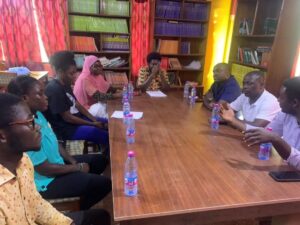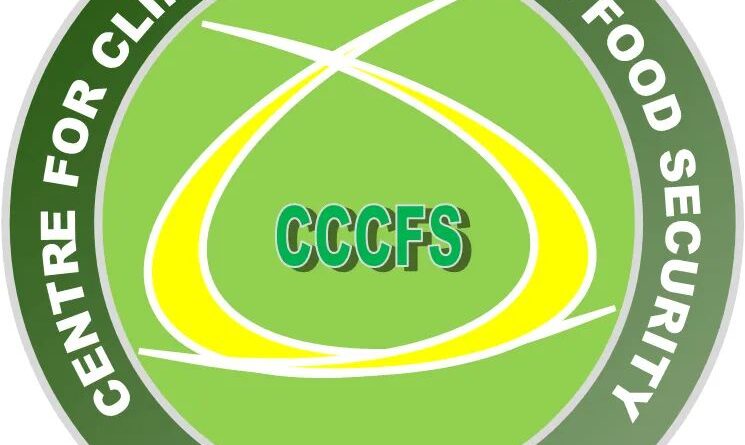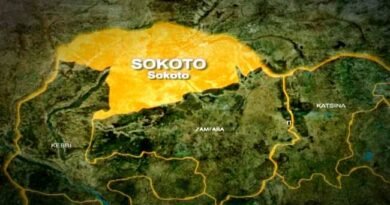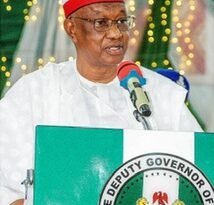How a Ghanaian NGO is changing lives without funding
With no foreign grants, no donor budgets, and powered only by passion, the Centre for Climate Change and Food Security (CCCFS) has spent the last decade educating and supporting farmers, women, youth, religious leaders, and journalists first in Ghana, and now across West Africa.
Founded in October 2015, CCCFS was born out of concern for how climate change, environmental degradation, and illegal mining were threatening food security, public health, and the survival of vulnerable communities.
From day one, the organisation has operated without a single donor cheque surviving instead on in-kind contributions from a handful of dedicated members.
“We may not have money, but we have knowledge, truth, and commitment,” says Executive Director Engr Mahmud Mohammed-Nurudeen.
Advocacy born from evidence
CCCFS began by running community education campaigns on climate change, sustainable agriculture, disaster preparedness, and sanitation.
They became the first NGO in Ghana to publicly call for a state of emergency on illegal mining locally known as galamsey warning of its devastating impact on rivers, farmlands, and public health.
“We conducted research and reviewed food testing in mining communities,” recalls Issifu Sulemana, CCCFS Director of Research.
“What we found was alarming, toxic levels of mercury in crops grown near polluted water sources. These are silent killers, and we cannot ignore them.”
This field-based advocacy, years before the issue became national news, helped draw attention to the hidden health risks of contaminated food.
Practical training and grassroots action
Beyond advocacy, CCCFS has run practical programmes, including:
Training religious leaders to interpret Ghana Meteorological Agency weather forecasts so they can guide their congregations on planting, disaster readiness, and climate adaptation.
Planting trees in cocoa-growing areas of Ashanti and beyond to restore degraded lands, protect biodiversity, and secure cocoa production.
Teaching farmers safe agrochemical disposal to prevent poisoning and environmental harm.
Running anti-food-waste campaigns in northern Ghana, explaining how waste fuels greenhouse gas emissions and threatens food supply.
Researching market women’s awareness of climate change and the dangers of indiscriminate tree cutting in Kumasi, while educating them on regulations and the benefits of urban greenery.
Since 2017, the organization has sensitized, educated, and trained thousands of students across Ghana on climate change, weather-related issues, and the importance of being guardians of the environment. Notable institutions include Anglican Senior High School, Al-Azhariya Islamic Senior High School, Kwame Nkrumah University of Science & Technology (KNUST), University of Development Studies (UDS), Christian Service University, and University College of Management Studies, among others.
Additionally, the organization has provided opportunities for students from various institutions, particularly KNUST and the University of Energy and Natural Resources (UENR), to intern with the organization, during which some have collected relevant data.

“These projects matter not just to Ghana but to the world,” says Mohammed-Nurudeen, “because they protect ecosystems, improve health, and support global climate action.”
A Setback and a Pivot
In 2025, CCCFS applied for its first international grant. They passed all stages except the last, where they were rejected for admitting they had never received foreign funding.
“That honesty cost us a lot,” says Mohammed-Nurudeen. “We could have lied or claimed to work with bigger organisations but we chose to speak the truth. Our honesty has become our identity. If it means we’ll suffer for it, so be it.”
Instead of giving up, the team partnered with Nigeria’s The North Journal to create something bigger: a six-week online training for West African journalists on biodiversity and ecosystem reporting.
Training journalists across West Africa
The programme, themed “Biodiversity Matters: How Africa’s Stories Can Shape a Sustainable Future”, began on July 11 and runs until August 15, 2025. Over 100 journalists applied, with just over 30 selected on merit.
The course covers biodiversity basics, the link between climate change and biodiversity, data-driven storytelling, ethics, investigative tools, and solutions journalism. Trainers included Dr. Vibha Varshney and Rajit Sengupta from India’s Down To Earth magazine, alongside experts from Nigeria and Ghana. The Centre for Science and Environment (CSE) in India provided its experts free of charge after many institutions declined support.
Each week, participants complete assignments, culminating in a publishable biodiversity story.
“This training opened my eyes to how biodiversity connects to everything from food to climate to our health. It’s exactly what we need,” says Nigerian journalist Zainab Adam.
For Hadiza Musah of Prime Time News, the experience was transformative:
“Although I’d heard the word biodiversity before, I’d never worked on it. This training taught me investigative techniques, mapping, and how to use my phone for storytelling. It has unlocked a part of me I didn’t know existed.”
Participants from Nigeria, Sierra Leone, Benin, and other countries shared similar sentiments praising the practical skills, exposure to new ideas, and regional collaboration.
Sheku Desmond, a Mass Communication student journalist at Fourah Bay College, University of Sierra Leone, said the six-week Biodiversity Training by GJESHA and the Nigerian North Journals was highly educational.
He gained practical tools for biodiversity reporting, learned valuable topics that will help his career, and promised to apply the knowledge. He thanked the organisers, participants, and speakers for the opportunity.
Sounouvo L. Bijou S., a science journalist from Benin, said the training deepened his understanding of biodiversity and survey techniques. Although French speakers struggled with the English delivery, he appreciated the knowledge gained, the networking opportunities, and recommended adding translations or PDF materials for mixed-language audiences in future editions.
Launching WAJESHA
On August 15, CCCFS will launch the West Africa Journalists for Environment, Science, Health & Agriculture (WAJESHA) network to unite journalists across the subregion in covering climate change, biodiversity, agriculture, and public health.
The keynote speaker will be Richard Mahapatra, Managing Editor of Down To Earth. Other speakers include APHRC West Africa’s Assane Diouf, Ghana’s Dr. Caleb Amankwah, Senegalese veteran journalist Famara Niassy, WASCAL’s Nii Commey, and Dr. Beatrice Wiafe-Addai of Breast Care International.
Discussions will focus on how cross-border journalism and partnerships can help shape Africa’s future.
Integrity over comfort
Through all this, CCCFS continues visiting remote farms, schools, mosques, churches, and radio stations — spreading climate knowledge without a single donor’s dollar.
“We are not giving up,” says Mohammed-Nurudeen. “Funding or no funding, the work must go on.”





